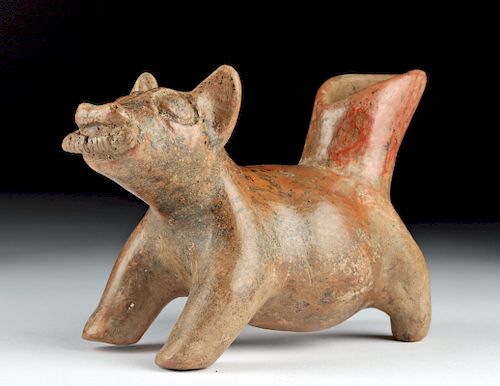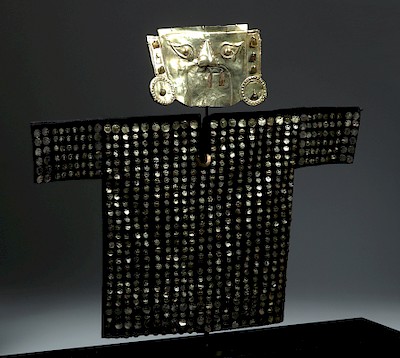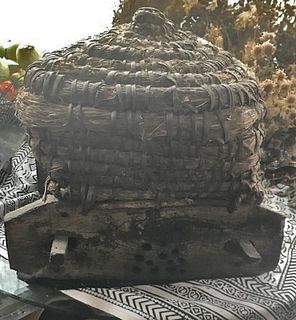Colima Redware Dog Effigy w/ Corn in Mouth
Lot 120e
About Seller
Artemis Fine Arts
686 S Taylor Ave, Ste 106
Louisville, CO 80027
United States
Selling antiquities, ancient and ethnographic art online since 1993, Artemis Gallery specializes in Classical Antiquities (Egyptian, Greek, Roman, Near Eastern), Asian, Pre-Columbian, African / Tribal / Oceanographic art. Our extensive inventory includes pottery, stone, metal, wood, glass and textil...Read more
Estimate:
$1,500 - $2,000
Absentee vs Live bid
Two ways to bid:
- Leave a max absentee bid and the platform will bid on your behalf up to your maximum bid during the live auction.
- Bid live during the auction and your bids will be submitted real-time to the auctioneer.
Bid Increments
| Price | Bid Increment |
|---|---|
| $0 | $25 |
| $300 | $50 |
| $1,000 | $100 |
| $2,000 | $250 |
| $5,000 | $500 |
| $10,000 | $1,000 |
| $20,000 | $2,500 |
| $50,000 | $5,000 |
| $100,000 | $10,000 |
| $200,000 | $20,000 |
About Auction
By Artemis Fine Arts
Jun 21, 2018
Set Reminder
2018-06-21 10:00:00
2018-06-21 10:00:00
America/New_York
Bidsquare
Bidsquare : DAY 2 | Pre-Columbian, Ethnographic, Fossils
https://www.bidsquare.com/auctions/artemis-gallery/day-2-pre-columbian-ethnographic-fossils-3277
Day 2 of an important 2-day auction featuring exceptional ethnographic art from around the world Artemis Fine Arts info@artemisgallery.com
Day 2 of an important 2-day auction featuring exceptional ethnographic art from around the world Artemis Fine Arts info@artemisgallery.com
- Lot Description
Pre-Columbian, West Mexico, Colima, ca. 300 BCE to 300 CE. An adorable and highly-burnished ceramic dog vessel, finely-molded in lustrous redware and standing proudly on all fours - presenting an attractive two-tone finish with a saturated red slip adorning the tail and a tawny orange-red slip on the rest of the body. The canine has a plump abdomen with a large cylindrical spout for a tail, with perky ears, coffee-bean-shaped eyes, and a wide nose comprising its roughly triangular head. The dog holds an ear of corn in its mouth, perhaps as a means of fattening it up for later consumption. A wonderful example that is finely constructed and full of character! Size: 7.125" L x 3.25" W x 4.5" H (18.1 cm x 8.3 cm x 11.4 cm).
Scholars know of at least two types of Colima dogs, one to be fattened up and ritually sacrificed or eaten and one to serve as a watchdog and healer of the ill. This plump hairless canine known as a Chichi or Escuintla is thought to be related to the Chihuahua or Mexican Hairless also known as the Xoloitzcuintle. The Xolo dog was named for the deity Xolotl, the God of the Underworld, and believed to guide the deceased as they journeyed to the afterlife. Colima vessels such as this one were buried in shaft tombs to protect the deceased and provide sustenance for eternity.
Provenance: private Las Vegas, Nevada, USA collection, collected between 1950 and 1965, thence acquired by current owner via family descent
All items legal to buy/sell under U.S. Statute covering cultural patrimony Code 2600, CHAPTER 14, and are guaranteed to be as described or your money back.
A Certificate of Authenticity will accompany all winning bids.
We ship worldwide and handle all shipping in-house for your convenience.
#136549Restoration to one ear. Surface wear and abrasions commensurate with age, light roughness on body, tail, and feet, with very minor nicks to tail, legs, and head, and some fading to slip coloration. Light earthen deposits and nice mineral deposits throughout.Condition
- Shipping Info
-
All shipping is handled in-house for your convenience. Your invoice from Artemis Gallery will include shipping calculation instructions. If in doubt, please inquire BEFORE bidding for estimated shipping costs for individual items.
-
- Buyer's Premium



 EUR
EUR CAD
CAD AUD
AUD GBP
GBP MXN
MXN HKD
HKD CNY
CNY MYR
MYR SEK
SEK SGD
SGD CHF
CHF THB
THB
















